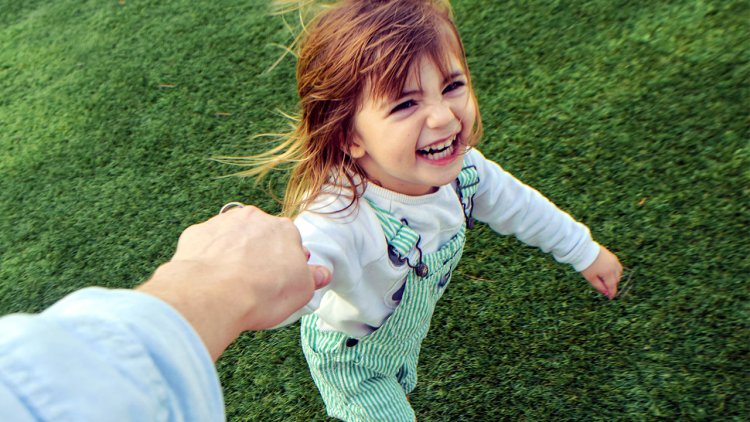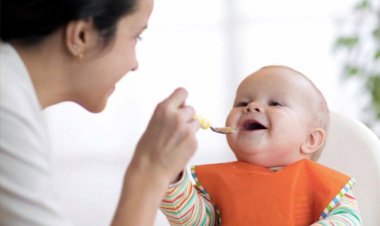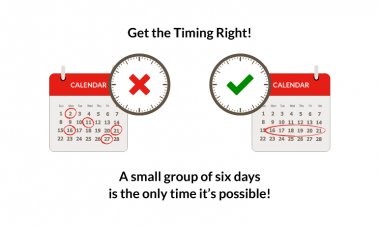The child will become a better person, these 10 parenting tips will help you
10 Good Parenting Tips- A good parent does not need to be perfect. No one is perfect. No child is perfect. It is very important to keep this in mind...

A good parent tries to take any decision in the interest of the child. A good parent doesn't need to be perfect. No one is perfect. No child is perfect. It is extremely important to keep this in mind when we set our expectations.
Successful parenting is not about achieving perfection. But that doesn't mean we shouldn't work towards that goal. Set high standards for yourself first and then second for the kids. Act as a role model for children. Parenting website mybabycare has cited some reports to give 10 tips to learn good parenting skills. Many of them are neither quick nor easy. But still, you can try them so that children can get a good upbringing…
1. Be a Good Role Model:
Set yourself a good role model for the kids. Don't just tell them what you want them to do, but show them to do it yourself.
Humans are a special species in terms of learning by imitation. Our programming is so that we understand others and follow their actions, which also becomes a habit. Children especially see very deeply the work done by their parents.
Therefore, be the person you want to mold or make your child the person you want to be – respect your child, show them positive attitudes and attitudes, be sympathetic to your child's feelings – and so will your child. This pattern will follow.
2: Love children and express it to them:
Show your love towards children. There is nothing like loving your child too much. To love children is not to spoil them. Many parents give their children material things, generosity, low expectations, and too much protection in the name of love. When you give children these things instead of love, your child is spoiling in reality.
Giving love to a child is as easy as hugging him, spending time with the children, and listening seriously to what they have to say every day.
When you express love in this way, the feel-good hormone oxytocin is released in children. These neurochemicals keep the mind calm, provide warmth and contentment of emotions, this will develop resilience in the child and strengthen the child's bond with you.
3. Practice Generous and Positive Parenting:
Babies are born with relatively few connections to approximately 100 billion brain cells (neurons). These connections create our thoughts, drive our actions, shape our personality and fundamentally determine who we are in reality. They are created, strong and tangible through our life experiences.
Present positive experiences to the child. In such a situation, they will have the ability to get positive experiences of themselves and present them to others. If you give negative experiences to your child then they will not develop as they should.
Sing a lullaby to the child. Run with them and take them to the park. Have fun with your baby. Be with the children in their ups and downs of emotions. With a positive attitude, solve any problem simultaneously.
These positive experiences not only build good connections in your child's brain, but they also create memories in the child's mind that your child carries throughout his life.
When it comes to discipline, staying positive seems difficult. But it is possible to practice positive discipline and avoid punishment.
Being a good parent means that you need to teach your child morals about what is right and what is wrong. Setting limits on everything and having good company is the key to good discipline. Be kind and firm when enforcing those rules. Pay attention to the reason behind every behavior of the child. And give the child a chance to learn for the future instead of punishing him for past mistakes.
4. Be a Safe Space for the Child:
Let your child know that you are always there for them and are sensitive to their cues and needs. Support and accept your child as an individual. Be a warm and safe person for your child so that he can share his mind with you.
The parents who bring up the child in this way also have better regulation development, social skill development, and mental development in those children.
5. Talk with the child and help them:
Most of us already know the importance of conversation. Talk to your child and listen carefully to them too. By having open conversations with children, you will have a better relationship with your child and your child will come to you for solutions when there is a problem.
But there's another reason for communication – you help your child get different parts of his brain working together.
Integration means integration is similar to our body in that various organs need to coordinate and work together to maintain a healthy body. When different parts of the brain are integrated, they can function harmoniously as a whole, which means smoother functioning, more coordinated behavior, greater empathy, and better mental health.
To do this, talk to children about experiences that have upset them. Ask your child to explain things in detail like how it happened, what happened and how he felt. Doing this will create communication between the two of you. You don't need to suggest a solution. You don't need to answer all the questions to be a good parent. Simply listening to them and asking clear questions will help them make sense of their experiences and integrate memories.
6: Impact on your own child
Many of us want to be separate parents from our parents for our children. Even those who had a good upbringing and a happy childhood want to change some aspects while raising a child.
But a lot of times, when we open our mouths, we speak just like our parents did.
Many times we want to have the same childhood as we ourselves have lived, it is a step towards understanding that we follow the way we do. Pay attention to the things that you want to change want and think about how you do it differently in real scenarios. Next time try to keep those issues in mind and change your behavior.
Don't give up if you don't succeed the first time. This practice demands a lot of practice, in order to change the way of parenting a child with awareness.
7. Take care of your health too:
Parents also need relief. So take care of your own health as well.
Often times when a baby is born, your own health or your marriage becomes a second priority and they are not taken care of. If this continues to happen continuously, then this problem can take a big form. Take time to strengthen your relationship with your spouse.
Do not hesitate to ask for help in raising the child. It is also necessary to take some "me-time" for taking care of yourself so that the mind and mind feel alive.
How parents can take care of themselves physically and mentally makes a huge difference in their upbringing and family life. If both of you fail in this, then your child will also be affected by it.
8. Do not scramble, no matter what:
No doubt, some parents sometimes even beat up the child to get him to talk to him and by doing so they feel relieved too.
However, in this wrong way, you will not be able to teach the right things to the child. With this, children will learn to fear only external things. In such a situation, the child being caught to avoid punishment will be motivated towards the child's trying behavior.
By assaulting the child, it will be established in their mind that they can solve the problem through violent means. Children who are victims of beatings and beatings are more likely to fight with other children. They are more likely to use bullying, abuse, physical aggression to resolve disputes. Later in life, they are also more likely to be vulnerable, as a result of antisocial behavior, poor relationships with parents, mental health issues, and domestic violence victims or abusers.
There are many better alternatives to discipline that have been shown to be more effective, such as positive discipline and positive reinforcement.
9: Remember the Goals in the Parenting Perspective:
Keep Things Personally and Remembers Your Permanent Goal
What is your goal of raising a child?
If you are like most parents, you want your child to do well in school, be productive, responsible and independent, respectful, caring and compassionate, and lead a happy, healthy and thriving life. .But how much time do you spend working towards those goals?
If you are like most parents, then you are probably thinking of customizing the child in one day itself. As the authors, Siegel and Bryson, explain in their book The Whole-Brain Child,
Don't let survival mode take over your life, so the next time you feel angry or frustrated, step back. Think about the consequences of anger and frustration for you or your child. Instead, find ways to turn every negative experience into a learning opportunity for him.
Doing so will not only help you have a healthier outlook, but you are also working towards one of your primary goals in building a good relationship with your child.
10: Take Advantage of the Latest Psychology and Neuroscience Research:
A lot of research has been done about parenting in psychology. In such a situation, because of the knowledge that has already been discovered by scientists, you should take advantage of it. Read some parenting books for science-approved good parenting advice and information that will guide you on how to raise a child properly.
Using scientific knowledge is certainly not a strategy that fits all girls. Every child is different. Even within the best parenting style, there can be many different effective parenting practices that you can choose from according to your child's temperament. For example, apart from assaulting the child, there are many better options, such as letting them Redirecting, Argumentation, Deletion of Privileges, you can choose the non-punitive discipline method that works best for your child.
According to the diathesis-stress model, people who suffer from a psychological disorder are more likely to develop one of them when they experience stress. Diathesis, ie weaknesses, can be biological or environmental.
Final Thoughts on Parenting:
The good news is, although parenting is hard work, it is also very rewarding. The bad part is that a lot of hard work and long hard work pays off in a good upbringing which is like a reward. But if we put in all our hard work from the beginning, we will eventually reap the rewards and there will be nothing to regret.

 mybabycare
mybabycare 















